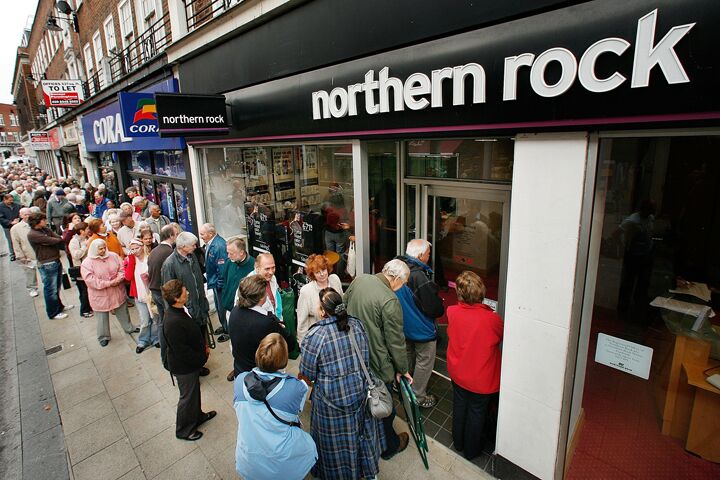
Spooked Brits Rush to Withdraw Savings
Like a scene from an economist’s horror movie, hundreds of people lined up last Friday to collect their savings from branches of the British bank Northern Rock. You may be forgiven for thinking these were scenes from a developing nation, or maybe the Great Depression, but they were not. Instead, this took place in one of the world’s financial capitals: London.
Unable to raise all the funds it needed, Northern Rock, Britain’s fifth-largest home loan provider, had to embarrassingly turn to the Bank of England for an emergency loan, causing mass panic among its customers. Worried that they were about to lose all their savings, many lined up for hours to get their money back. According to the Financial Times, consumers withdrew about ₤2 billion (roughly us$4 billion).
What is possibly the most disturbing aspect of this story, however, is that before the current credit crisis, Northern Rock was considered a solid bank. The bank actually has almost no direct exposure to America’s imploding subprime loan market. Yet, it only took about a month of adverse economic conditions to bring the bank to its knees.
Investments that were directly or indirectly related to subprime loans totaled less than 0.25 percent of Northern Rocks’ assets, but its situation is an indirect consequence of the subprime loan crisis. Northern Rock found that it simply could not raise enough cash on the capital markets because of global credit conditions. Its business model differs from that of many other banks in that it relies on the wholesale money markets to finance its loans. Following the subprime loans crisis, the global credit market grew tighter and tighter, as banks became more and more reluctant to issue credit. Because of this, Northern Rock found itself unable to borrow the money it needed.
Its subsequent request for emergency assistance from the Bank of England marked the first bail-out of a British bank in 15 years.
The fact that a bank with very little exposure to subprime loans ended up in such dire straits is very worrying to economists. According to Jonathan Loynes, an economist at the consultancy firm Capital Economics, “The problems are potentially much wider now. This means we have to worry about a wider range of institutions that aren’t directly involved in this credit crisis, but are in a way innocent bystanders.”
Jean-Claude Juncker, who chaired a meeting of European finance ministers and central bankers Friday, expressed similar sentiments. “I don’t think the worst is behind us,” he said during a news conference.
Concerns about consumer spending are also causing several economists to significantly downgrade their predictions for the UK economy. In recent years, Britain’s economy has been fueled by rising house prices. The kind of money shortage that forced Northern Rock into its predicament is also making it harder for banks to finance mortgages. Already rates are creeping up for new customers, and existing customers could soon be hit.
Many people in the UK are living off debt, financing their lavish spending by re-mortgaging their homes. If the housing market is badly hit and houses in the UK fall sharply in value, the repercussions could be appalling.
This situation could also cause problems on a more fundamental level. The modern capitalist system is primarily based on trust. What events at Northern Rock did was erode that trust, if only slightly. If this trust does disappear, the entire system collapses.
Will America’s subprime loan crisis trigger larger global economic consequences? Possibly. Investors and banks around the world are dealing with the negative ramifications of America’s investment and banking system. America has exported the ill effects of a popping housing bubble around the world. Now, trust in the world’s very economic system is being questioned.
A global economic collapse is coming. The sure word of biblical prophecy reveals this eventuality. Is this the start of it? We’ll have to watch and see.
For more information about the coming economic crisis, see “The Coming Storm.” To learn how to protect yourself and your family, see “Storm-Proof Your Financial House.”
